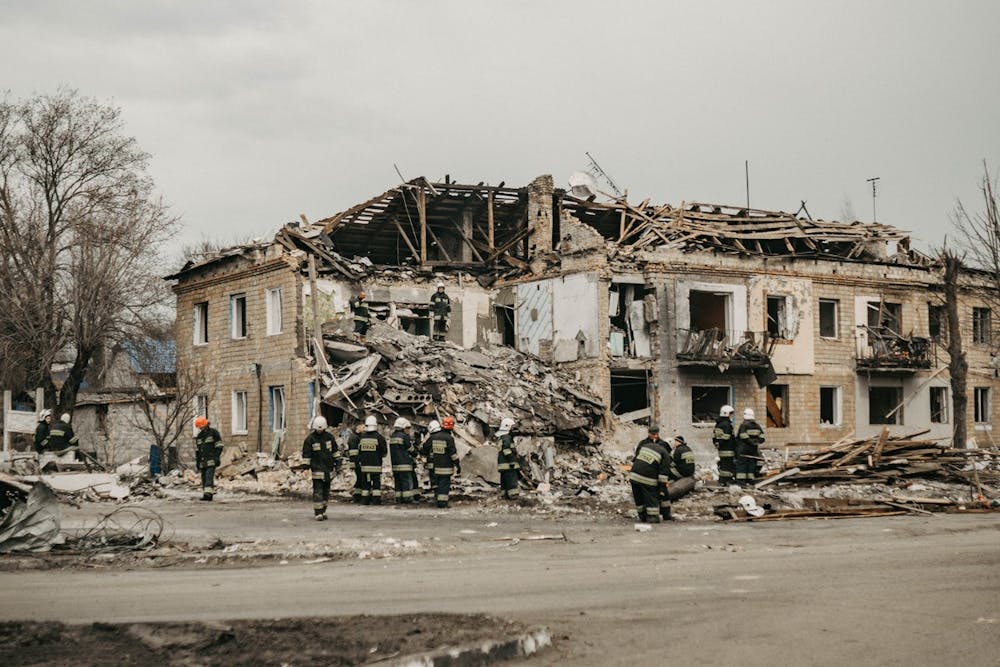On Thursday, Mar. 24 of this year, Russia invaded its neighbor and post-Soviet state, Ukraine. The world was shocked.
In basic international relations classes, I was taught that interstate war is in the past and that the rapid loss of life and mass destruction over a disagreement of ideas ended with the Cold War. I was taught that war today is almost always protracted and within a state, and that conflicts between states are incredibly rare.
This is why I, and the world, was stunned with Russian President Vladimir Putin’s invasion of Ukraine, the complete disregard for sovereignty and the immediate mass destruction.
The invasion made eyes across the world watch in horror – unactionable, confused horror. Everyone was talking about it, social media was ablaze and, even though not everyone knew the exact intricacies of Putin’s motivations or war efforts, everyone knew that a serious dilemma had risen in eastern Europe.
Despite my two-month TikTok phase in the summer of 2019, when the mind-draining app was all the rage, I haven’t scrolled on it since. I’m adamantly anti-TikTok – I’m scared of its addictive algorithms and time sucking capabilities – but I acknowledge that it's a vital part of the 21st century and Gen Z culture, and I’ll admit it’s pretty hilarious.
TikTok’s virtue – and vice – is its ability to harness an entire world through the recognition of songs, jokes and dance moves. And on Mar. 25, 2022, it used this ability to spread awareness of the Russian invasion of Ukraine.
Now it’s mid-April, and the trends about Ukraine have quickly passed, but the war has not. I know that it’s difficult to gain perspective on such a massively important event, as a global politics major who regularly reads about the war for homework, but to me it seems as if nobody is talking about it anymore.
It’s been reported that 2,685 civilians have been killed, 4.1 million refugees have fled and an estimated 14,000 Ukrainian military personnel have died in conflict. In 7 weeks.
For perspective, 4,431 US soldiers died in the Iraq War. In 7 years.
Even though the social media algorithms have left Ukraine behind, world news outlets have not. And guess what? Miami University offers free subscriptions to the New York Times and The Wall Street Journal for its students.
I highly, highly recommend taking advantage of these resources for easy access to instant world news.
We are lucky to have access to fairly reliable media platforms that can report on the war in live time while we sit at home, but even though the news outlets are free for Miami Students, the reporting itself comes at a price.
Enjoy what you're reading?
Signup for our newsletter
At least six journalists have died in Ukraine while tracking the war. They’re risking their lives to tell the stories of these atrocities. So please, let's read about the conflict for which they have given their lives.
Although the attention on Ukraine might currently be lacking, there are conflicts around the world that aren’t even remembered once they leave the TV screen or expire from an Instagram story. It’s vital to acknowledge these ongoing crises: terror in Afghanistan from the Taliban, a famine in Yemen due to rebel insurgency, a civil war in Syria and violence in the Democratic Republic of the Congo, to name only a few.
Although it’s no longer common to see on TikTok, the damage that Putin’s government has done to Ukraine is still relevant even on our campus and in our community.
Kharkiv, the second-largest city in Ukraine, is Cincinnati's sister city and received massive Russian damage at the beginning of the war. On campus, student and first-generation Ukrainian-American Solomia Semenyuk and her friends raised $3,000 for a service group in Ukraine. Oxford has ties to this war – more so than you might think.
The Russian government has a masterful history of state-run media and a modus operandi of heavy propaganda, always in favor of the regime. But we students have the resources, the platforms and the freedom to speak out about such atrocities and make sure that the sacrifices of innocents are never forgotten.
So please don’t stop talking about Ukraine.




